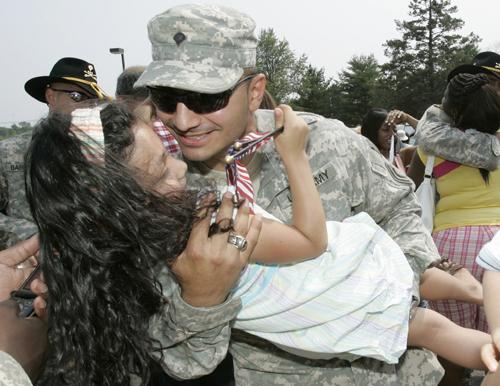Army may prolong combat tours in Iraq

National Guardsman Carlos Cabezas, of Union, N.J., hugs his daughter Kaira, 5, as he arrived at Fort Dix, N.J., on Tuesday as two guard units returned home after being deployed in Iraq for almost two years. The Army is deliberating on whether to extend tr Mike Derer, The Associated Press
Jun 20, 2007
Last updated on May 12, 2016 at 12:34 p.m.
WASHINGTON – The Army is considering whether it will have to extend the combat tours of troops in Iraq if President Bush opts to maintain the recent buildup of forces through spring 2008.
Acting Army Secretary Pete Geren testified Tuesday that the service is reviewing other options, including relying more heavily on Army reservists or Navy and Air Force personnel, so as not to put more pressure on a stretched active-duty force.
Most soldiers spend 15 months in combat with a guaranteed 12 months home, a rotation plan that has infuriated Democrats because it exceeds the service’s goal of giving troops equal time home as in combat. In coming weeks, the Senate will vote on a proposal by Sen. Jim Webb, D-Va., that would restrict deployments.
“It’s too early to look into the next year, but for the Army we have to begin to plan,” Geren told the Senate Armed Services Committee. “We have to look into our options.”
Get The Daily Illini in your inbox!
Gen. David Petraeus, Iraq war commander, suggested Sunday that conditions on the ground might not be stable enough by September to justify a drop in force levels, and he predicted stabilizing Iraq could take a decade. Earlier this year, Bush ordered the deployment of some 30,000 additional troops as part of a massive U.S.-led security push around Baghdad and the western Anbar province.
There are about 156,000 U.S. troops in Iraq.
When asked by Senate Armed Services Committee Chairman Carl Levin, D-Mich., whether maintaining the force buildup would affect soldiers’ 15-month combat schedules, Geren said he was unsure and cited “numerous options” available, including a “different utilization of the Guard and Reserve” and relying on the other services for help.
“We’re committed to filling the requirements that the combatant commander asks,” Geren said. “We have been able to do so up until now, and we will continue to do so.”
The Army assessment comes as Democrats say they are already dissatisfied with the existing policy.
“Who was talking for the well being and the health of the soldiers when this requirement was put down?” asked Webb, referring to the 15-month combat tours. After four years of combat, the strategy in Iraq cannot “justify doing this to the soldiers in the Army and the families back here,” he said.
Lawmakers said they also were concerned about the Army’s ability to care for soldiers suffering from post-traumatic stress syndrome and brain injuries.
Geren said the Army is beginning an effort to educate senior military officers on how to identify symptoms. And last week, the Army contracted to hire 200 more mental health professionals, increasing such staff by more than 20 percent.





